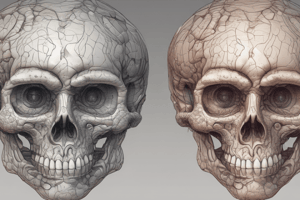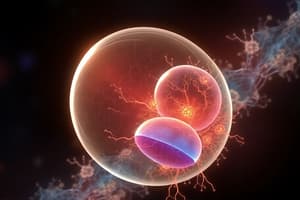Podcast
Questions and Answers
What structures are formed from the ectoderm tissue folds during embryonic development?
What structures are formed from the ectoderm tissue folds during embryonic development?
- Heart and brain
- Jaws and neck structures (correct)
- Lungs and liver
- Hands and feet (correct)
During which week does the brain begin to develop in the embryo?
During which week does the brain begin to develop in the embryo?
- Fifth week
- Third week
- Fourth week (correct)
- Sixth week
What forms the neural tube that will become the future spinal cord?
What forms the neural tube that will become the future spinal cord?
- Neural groove surrounded by neural folds (correct)
- Branchial arches developing in the mesenchyme
- Neuroectoderm cells migrating from ectoderm
- Oropharyngeal membrane and cloacal membrane
Which of the following structures is NOT developed from the endoderm tissue buds?
Which of the following structures is NOT developed from the endoderm tissue buds?
What characterizes the growth of cells along the back of the embryo compared to the front?
What characterizes the growth of cells along the back of the embryo compared to the front?
What is formed when the neural folds meet superior to the neural groove?
What is formed when the neural folds meet superior to the neural groove?
What structures do the branchial arches develop into?
What structures do the branchial arches develop into?
During which week does the development of the nose begin with the formation of nasal pits?
During which week does the development of the nose begin with the formation of nasal pits?
What crucial role do neural cells derived from the neuroectoderm play during development?
What crucial role do neural cells derived from the neuroectoderm play during development?
What significant structure forms at the cephalic end of the embryonic disc?
What significant structure forms at the cephalic end of the embryonic disc?
Flashcards
Neural Tube Formation
Neural Tube Formation
The neural plate folds inwards to form a hollow tube, the neural tube, which will become the spinal cord and brain.
Neuroectoderm
Neuroectoderm
The part of the embryo's ectoderm that gives rise to the nervous system.
Branchial Arches
Branchial Arches
Structures that develop into jaws and neck structures.
Oropharyngeal membrane
Oropharyngeal membrane
Signup and view all the flashcards
Internal Organ Development
Internal Organ Development
Signup and view all the flashcards
Where does the CNS develop?
Where does the CNS develop?
Signup and view all the flashcards
What forms the neural tube?
What forms the neural tube?
Signup and view all the flashcards
What happens at the cephalic end?
What happens at the cephalic end?
Signup and view all the flashcards
What do neural crest cells do?
What do neural crest cells do?
Signup and view all the flashcards
What forms in the fifth week?
What forms in the fifth week?
Signup and view all the flashcards
Study Notes
Oral Histology: Development of the Face
-
Fourth Week: Central nervous system (CNS) forms from ectoderm. Neuroectoderm forms a neural plate, extending from head to tail. The plate thickens and invaginates, forming the neural groove, which deepens and becomes surrounded by neural folds. These folds fuse, creating the neural tube. The superior portion of the tube will become the spinal cord.
-
Fourth Week (continued): The embryo's back grows faster than the front, creating a curved shape. The oropharyngeal membrane (future mouth) appears at the head end, and the cloacal membrane (future anus) is at the tail end.
-
Neural Crest Cells: Important for head and neck development, originating from neuroectoderm and migrating into surrounding tissues.
-
Fifth Week: Nose develops as nasal pits, jaws and ears form. Hands and feet develop. All major internal organs start developing. Ectoderm tissue folds connect at the front of the embryo to create the chest and abdominal cavity walls.
Studying That Suits You
Use AI to generate personalized quizzes and flashcards to suit your learning preferences.




